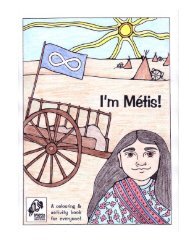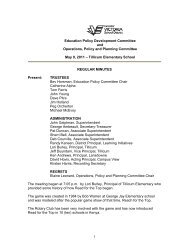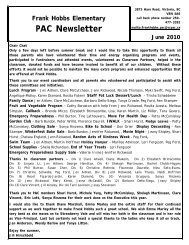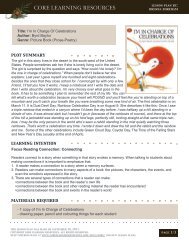First Nation Literature Units Senior 1 - Victoria School District 61
First Nation Literature Units Senior 1 - Victoria School District 61
First Nation Literature Units Senior 1 - Victoria School District 61
Create successful ePaper yourself
Turn your PDF publications into a flip-book with our unique Google optimized e-Paper software.
She married at a young age, raised a family and divorced, and eventually gained her<br />
grade twelve education ("except in Math, and in that I have grade ten"). While living in<br />
Nanaimo, New Westminster and Cloverdale, she supported herself with a variety of jobs,<br />
including BC Tel operator and medical assistant with the RCAF. Cameron began writing theatre<br />
scripts and screenplays under the name Cam Hubert. Her stage adaptation of a documentary<br />
poem developed into a play about racism, Windigo. It was the first presentation of Tillicum<br />
Theatre, possibly the first Indian-based theatre group in Canada, in 1974. "Tillicum Theatre was<br />
started in Nanaimo under a LIP grant," she says, "and, with a cast of native teenagers, it toured<br />
the province presenting dramatizations of legends and a theatre piece based on the death of Fred<br />
Quilt, a Chilcotin man who died of ruptured guts after an encounter with two RCMP on a back<br />
road at night." A Matsqui Prison production of Windigo also toured B.C. with a cast of Indian<br />
prison inmates.<br />
In 1979, her scripted film Dreamspeaker, directed by Claude Jutra, won seven Canadian<br />
Film Awards, including best script. It's the story of an emotionally disturbed boy who runs away<br />
from the hospital and finds refuge with a kindly old Indian (portrayed by George Clutesi) and his<br />
mute companion. Subsequently published as a novel, Dreamspeaker won the Gibson Award for<br />
<strong>Literature</strong>.<br />
About the Novel<br />
14<br />
www.annecameron.ca<br />
In Anne Cameron's novel, Dreamspeaker, 11-year-old Peter Baxter is plagued - or<br />
blessed - with the recurrent mental experiences of visions that seem like epileptic fits or seizures.<br />
As the novel opens, Peter is being taken to a treatment facility after having been in numerous<br />
foster homes. At age four, he was taken by social workers from his mother, a prostitute and a<br />
heroin addict. Peter feels drawn to his social worker, Anna, and has liked some of his foster<br />
families, too, but he keeps being transferred without quite knowing why. Blond, nice-looking<br />
but "odd," he has been taught good table manners but little else. As Anna says, the system has<br />
been "totally unable to find an answer for Peter's problems."<br />
In the facility, Peter has a seizure which brings on a recurrent nightmare - or vision - of a<br />
snakelike creature threatening to take him over. To escape the monster, he flees the facility,<br />
hops a train, and travels to a coastal area of B.C. where settlement is sparse and the main<br />
economic endeavours are forestry and small-scale farming.<br />
While eating raw oysters on the beach, Peter meets one of the most remarkable fictional<br />
creations in Canadian literature. An old native man comes out of the forest and offers Peter a<br />
home-cooked meal. "His face was lined and seamed, his eyes nearly hidden in wrinkles. His<br />
hair was long and thin and blew every which way." With the old man is a large solemn-looking<br />
middle aged man who does not speak.<br />
The old man feels that Peter has come to him by fate, as other needy children have,<br />
starting in boyhood when he brought unwanted children home to his parents. "It was said in the<br />
village that he could find a child where others couldn't find a fish." The only difference is that<br />
Peter is "not of the people," but white. "Grandpa" gave asylum to his silent companion years ago<br />
after a bullying incident in town when the mute man was a teenager. The two live in a cabin










